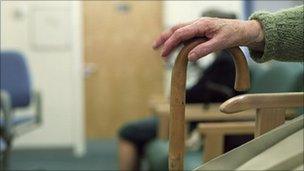Plans for greater scrutiny of elderly care in England
- Published
Care Services Minister Paul Burstow: "We're absolutely determined to shine a light on bad practice"
Plans to "radically drive up" standards of social care in England to protect the elderly have been unveiled by the government.
They include an online "good care guide" to allow family members to rate and review care homes and providers.
Age UK "broadly welcomed" the rating suggestion but called for more funding to improve the independent regulator.
Meanwhile, the Archbishop of York, Dr John Sentamu, has called for reforms in the way care is funded.
Care Services Minister Paul Burstow said the government's new plans would help to tackle "quality and mistreatment".
The ideas - proposed during workshops of care users and their relatives - will form plans for a new patients' rights group, Healthwatch.
They will go on to form the basis of a white paper in the spring.
As part of the plans, ratings for care and dignity standards for residential homes and home care providers would be published online, similar to the way websites used for booking holidays do.
It would include the latest information from inspections, plus any record of mistreatment or abuse by staff, as well as feedback from care users and relatives.
Under the proposals, local Healthwatch scrutiny teams would visit and speak to residents about their experiences. Committees featuring relatives of care users will also be formed to scrutinise services that do not meet standards.
However any formal inspection would still rest with the Care Quality Commission (CQC), the independent regulator of health and social care services in England.
Ministers hope it will provide a "more qualitative assessment" from the point of view of residents and their loved-ones of local care standards and would "empower people as never before" to choose the right care.
Healthwatch will, by law, be able to use duties placed on care homes which contain state-funded residents to let representatives into their premises for visits.
Ministers say they will look into options for allowing Healthwatch onto the premises of the minority of care homes with private-only residents.

The Archbishop of York has tweeted on the subject of care reform
Mr Burstow said: "Measures like publishing social care comparison sites and opening care services up to greater scrutiny will revolutionise the way people and their loved-ones choose their social care.
"It can't be right that you can find out exactly what a hotel or restaurant is like, in just a short time searching the web, but people have so much trouble working out the standards of different care homes and home care providers - when that choice is so much more important.
He said as well as highlighting good quality care providers, "we're intent on doing absolutely all we can to shine a light on bad treatment and raise quality for everyone".
National standard
In an open letter to the prime minister, the Archbishop of York said the report by the Dilnot Commission, which recommended a £35,000 cap on individual contributions to social care costs, "had shown us the way forward".
The Dilnot Commission was a government-backed review into the long-term funding of care in the elderly.
It recommended that social care costs in England should be capped so people do not face losing large chunks of their assets but ruled out calling for care to be free.
The report also argued there should be a national standard so everyone had the same access no matter where they lived.

Age UK said it did not want to see the proposals detracting from work already being done
Dr Sentamu said: "The current adult care funding system in England is widely acknowledged to be unfit for purpose and to need urgent and lasting reform.
"What is needed is a system for funding care which enables the risk to any one individual to be pooled, through taxation or insurance or, preferably, a mix of them both," he added.
On Sunday morning Dr Sentamu tweeted:, external "I am calling on the Prime Minister, and taxpayers in England, to help reform funding of care for older people."
Age UK, the older people's charity, said it did not want to see the proposals detract from the work the CQC already does.
"Age UK broadly welcomes the care home rating suggestion as a potentially useful addition to the existing system of care quality commission inspections and we have been calling for elements of the proposals for a while," a spokesman said.
"But most important is radical and urgent reform to ensure a fair and sustainable care system for the future, which is why we are calling for a white paper in the spring which embraces the recommendations of the Dilnot Commission."
- Published2 December 2011
- Published23 November 2011
- Published22 November 2011
- Published10 July 2011
- Published4 July 2011